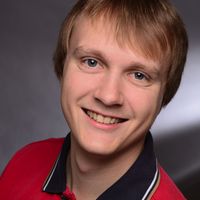Jun.-Prof. Dr. Alexander Engel
Project leader

Universität Greifswald
E-mail: alexander.engel(at)uni-greifswald.de
Homepage: https://math-inf.uni-greifswald.de/forsc…
Project
10Duality and the coarse assembly map
45Macroscopic invariants of manifolds
Publications within SPP2026
We construct a slant product on the analytic structure group of Higson and Roe and the K-theory of the stable Higson corona of Emerson and Meyer, which is the domain of the co-assembly map. In fact, we obtain such products simultaneously on the entire Higson-Roe sequence. The existence of these products implies injectivity results for external product maps on each term of the Higson-Roe sequence. Our results apply in particular to taking products with aspherical manifolds whose fundamental groups admit coarse embeddings into Hilbert space. To conceptualize the general class of manifolds where this method applies, we introduce the notion of Higson-essentialness. A complete spin-c manifold is Higson-essential if its fundamental class is detected by the stable Higson corona via the co-assembly map. We prove that coarsely hypereuclidean manifolds are Higson-essential. Finally, we draw conclusions for positive scalar curvature metrics on product spaces, in particular on non-compact manifolds. We also construct suitable equivariant versions of these slant products and discuss related problems of exactness and amenability of the stable Higson corona.
| Journal | Annales de l'Institut Fourier |
| Volume | 71 (2021) no. 3 |
| Pages | 913-1021 |
| Link to preprint version | |
| Link to published version |
Related project(s):
10Duality and the coarse assembly map
This paper is a systematic approach to the construction of coronas (i.e. Higson dominated boundaries at infinity) of combable spaces. We introduce three additional properties for combings: properness, coherence and expandingness. Properness is the condition under which our construction of the corona works. Under the assumption of coherence and expandingness, attaching our corona to a Rips complex construction yields a contractible \(\sigma\)-compact space in which the corona sits as a \(\mathbb{Z}\)-set. This results in bijectivity of transgression maps, injectivity of the coarse assembly map and surjectivity of the coarse co-assembly map. For groups we get an estimate on the cohomological dimension of the corona in terms of the asymptotic dimension. Furthermore, if the group admits a finite model for its classifying space \(BG\), then our constructions yield a \(\mathbb{Z}\)-structure for the group.
| Journal | Journal of Topology and Analysis |
| Volume | online ready |
| Pages | 83p |
| Link to preprint version | |
| Link to published version |
Related project(s):
10Duality and the coarse assembly map
We construct a natural transformation between two versions of G-equivariant K-homology with coefficients in a G-C*-category for a countable discrete group G. Its domain is a coarse geometric K-homology and its target is the usual analytic K-homology. Following classical terminology, we call this transformation the Paschke transformation. We show that under certain finiteness assumptions on a G-space X, the Paschke transformation is an equivalence on X. As an application, we provide a direct comparison of the homotopy theoretic Davis–Lück assembly map with Kasparov’s analytic assembly map appearing in the Baum–Connes conjecture.
Related project(s):
45Macroscopic invariants of manifolds
For a countable group G we construct a small, idempotent complete, symmetric monoidal, stable ∞-category KK^G_sep whose homotopy category recovers the triangulated equivariant Kasparov category of separable G-C*-algebras, and exhibit its universal property. Likewise, we consider an associated presentably symmetric monoidal, stable ∞-category KK^G which receives a symmetric monoidal functor kk^G from possibly non-separable G-C*-algebras and discuss its universal property. In addition to the symmetric monoidal structures, we construct various change-of-group functors relating these KK-categories for varying G. We use this to define and establish key properties of a (spectrum valued) equivariant, locally finite K-homology theory on proper and locally compact G-topological spaces, allowing for coefficients in arbitrary G-C*-algebras. Finally, we extend the functor kk^G from G-C*-algebras to G-C*-categories. These constructions are key in a companion paper about a form of equivariant Paschke duality and assembly maps.
Related project(s):
45Macroscopic invariants of manifolds
We strengthen a result of Hanke-Schick about the strong Novikov conjecture for low degree cohomology by showing that their non-vanishing result for the maximal group C*-algebra even holds for the reduced group C*-algebra. To achieve this we provide a Fell absorption principle for certain exotic crossed product functors.
Related project(s):
10Duality and the coarse assembly map
We enlarge the category of bornological coarse spaces by adding transfer morphisms and introduce the notion of an equivariant coarse homology theory with transfers. We then show that equivariant coarse algebraic K-homology and equivariant coarse ordinary homology can be extended to equivariant coarse homology theories with transfers. In the case of a finite group we observe that equivariant coarse homology theories with transfers provide Mackey functors. We express standard constructions with Mackey functors in terms of coarse geometry, and we demonstrate the usage of transfers in order to prove injectivity results about assembly maps.
Related project(s):
10Duality and the coarse assembly map
We show injectivity results for assembly maps using equivariant coarse homology theories with transfers. Our method is based on the descent principle and applies to a large class of linear groups or, more general, groups with finite decomposition complexity.
Related project(s):
10Duality and the coarse assembly map

